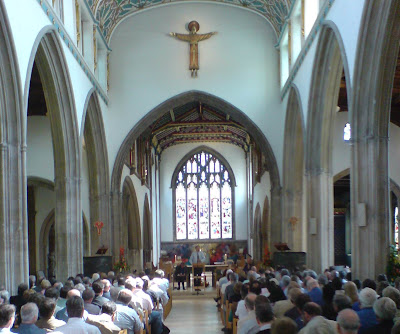Last week I attended a training course at Pleshey (part 2 of ‘how to look after your curate’ although it wasn’t officially called that). This post explains my disquiet about one aspect of the course – click ‘full post’ for text.
This part of the course was primarily about the art of supervisions, how to conduct the regular meetings between training incumbent and curate in such a way that the curacy ‘succeeds’. There was a strong sense that the Diocese has been a little scarred by, some years back, a high number of curacies ‘failing’ – hence a renewed emphasis on the training of the incumbents who are due to receive a curate for training.
However, I was a little alarmed that in the opening session we ventured straight into various secular analyses of supervision which, however worthy, are not automatically entitled to be accepted within the church. I asked whether we were going to spend any time exploring the theology of supervisions and it seemed that apart from a minimal engagement with some passages from Mark’s gospel, we weren’t. This I see as a typical example of the way in which training as a whole in the Church of England is not just theologically lightweight but prone to being captured by secular philosophies travelling under the guise of ‘professionalism’.
What I want to do in this post is sketch out the sort of theological framework that would need to be explored prior to engaging with the secular perspectives. I have no doubt that secular perspectives have much to contribute to the conversation, it’s just that I believe we need to ‘arm ourselves with the Word’ before engaging with them, so that our minds are attuned to what is compatible with our faith and what is not. I don’t have any especial expertise in this area so this is really a requested agenda in four parts, to be developed by those who are more qualified.
First: I would want to establish the essential groundwork, which would be something about relationships. We worship the one God, Father, Son and Holy Spirit, a God who is relational within Himself – and therefore relationships are at the heart of the Christian life. What we have in the supervision is above all a particular and intense form of relationship. Clearly there is a lot of relationship between incumbent and curate that will happen outside of the supervision, but the supervision is when it will come under the microscope, and where there is the greatest opportunity for serious and prayerful growth, so I would want to make this the first theological point: that paying attention to the quality of the relationship between curate and incumbent, and ensuring that it functions well, is the primary task of the supervision process. This can then be developed by describing the particular characteristics that would enable the relationship to function well, eg that it should be truthful (for the truth sets us free) and that it should be loving in the way that Christ embodied etc.
Second: I would want to explore ‘the Eli principle’. What I have in mind is the passage in Samuel where Samuel receives his call from God. Eli is in the supervisory relationship and he at first sees the call that Samuel receives as an irritation (it disturbs his sleep – a theologically significant description). However, when Eli eventually recognises that God is present in the process he enables Samuel to listen to God and to follow his own vocation, at great personal cost. This seems to me to be the essential aspect to emphasise at the heart of the supervisory relationship: that God has a particular call on the curate’s life, and that this does not necessarily travel through the incumbent. The relationship of incumbent to curate is not that of parent to child, but that of midwife to child – with God as the parent. The task of the incumbent is to enable the particular vocation that God has implanted within the curate to come to flower. As with Eli, this may be a costly endeavour.
Third: I find it remarkable that there was no time on the course when incumbents were enabled to spend time with the ordinal, exploring the different elements contained within it. That could easily be covered in a session like this – or, even better, used as the framework for all the worship elements through the two parts of the course. That was a missed opportunity I think.
Finally: I would want to explicitly articulate and own the different varieties of ministry that are possible within the parameters of the ordinal. I was concerned on the course that there was often a tacit acceptance of the George Herbert model of ministry, even if it was often in the context of the more mature members lamenting the way in which the ‘new generation’ didn’t respect it. It would have been helpful if we had spent time considering the New Testament passages describing a variety of ministries, eg the five-fold division listed in Ephesians. This may have had a direct and positive practical impact in enabling the ‘Eli principle’ that I mentioned above. It would also have been a good opportunity to touch on wider issues, eg mission and the changed context of a post-Christendom church, which have a very real salience in the context where the curates will be working, and which therefore throw into question what sort of model of ministry should be followed by a curate.
I think a session devoted to exploring these elements would have been extremely beneficial. One of the best things about the course was the opportunity to hear people of widely differing churchmanships and experience discussing what it meant to train a curate. I think that conversation would have been enhanced if we had been able to share and debate the theological frameworks underlying our task as training incumbents.


